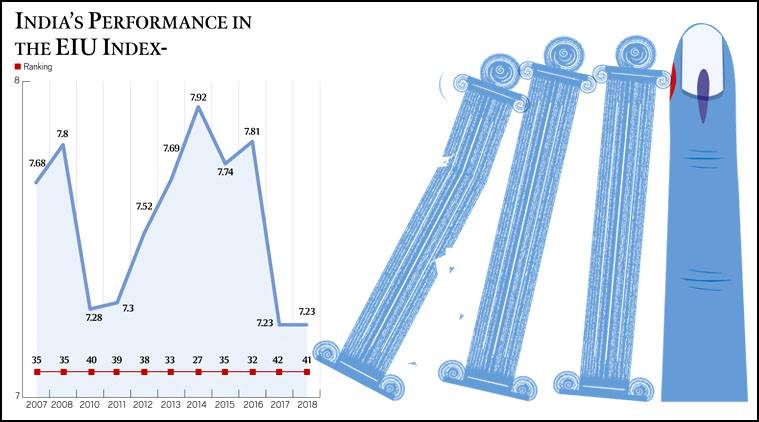Slipping on democracy
A recent Democracy Index confirms the paradox of India being the world’s largest electoral wonder, but an increasingly flawed democracy.

The Economist Intelligence Unit recently published its 11th report on the “State of Democracy in the World in 2018” titled “Me Too? Political participation, protest and democracy”. The EIU has over seven decades of experience in studying the spectrum of democracies in the world. The index made news last year when India had slipped 10 straight positions, from 32 to 42, ranking below Latvia and South Africa.
The survey ranks 165 independent countries based on five parameters — namely, electoral process and pluralism, civil liberties, functioning of the government, political participation and political culture. Based on a comprehensive survey containing 60 questions under five categories, the index classifies countries into four types — Full Democracies, Flawed Democracies, Hybrid Democracies and Authoritarian Regimes.
The countries range from Norway, scoring an almost perfect 9.87 out of 10, to North Korea at 167, scoring an abysmal 1.08 out of 10. Only 20 countries (4.5 per cent of the world population) are full democracies, down from around 11 per cent at the start of this decade. Most of the shift has taken place into flawed democracies, which constitute the largest group with 43 per cent of the world’s population. A third of the world lives under authoritarian governments, the majority being in China.
Nordic democracies continue to top the rankings year after year, with high political participation, robust welfare state and progressive workers’ rights and environmental standards. The top five are Norway, Iceland, Sweden, New Zealand and Denmark, while the bottom five are generally war-ravaged nations with highly authoritarian regimes, namely Chad, Central African Republic, Democratic Republic of Congo, Syria and North Korea.
Even though the voters are disillusioned with the political parties and “formal political institutions”, voter turnout was on the rise in 2018, in expression of disillusionment. The culture of protest is on the rise, with a number of demonstrations around the world for a plethora of causes. The rise of social media has made public outreach quicker and easier, making lawful assembly an increasing trend. Hence, the report concludes that citizens are “turning anger into action”.
Quotas for women candidates have made parliaments more inclusive, pointing to the instrumental importance of positive political discrimination. Japan introduced women’s quota legislation in 2018. In the subcontinent, Nepal already tops South Asia in women’s representation, with 33 per cent of the seats reserved for women in Parliament and a record 40 per cent of women in local bodies. Bangladesh has 14 per cent reserved seats and Pakistan also reserves 17 per cent and 15 per cent in the Lower and Upper Houses respectively. It is time the Indian Parliament also walks the talk on women’s representation. The NDA government, which could pass a constitutional amendment for 10 per cent reservation for the economically weak in three days, could have easily created a women’s quota in legislatures if there was political will.










.png)




























No hay comentarios:
Publicar un comentario